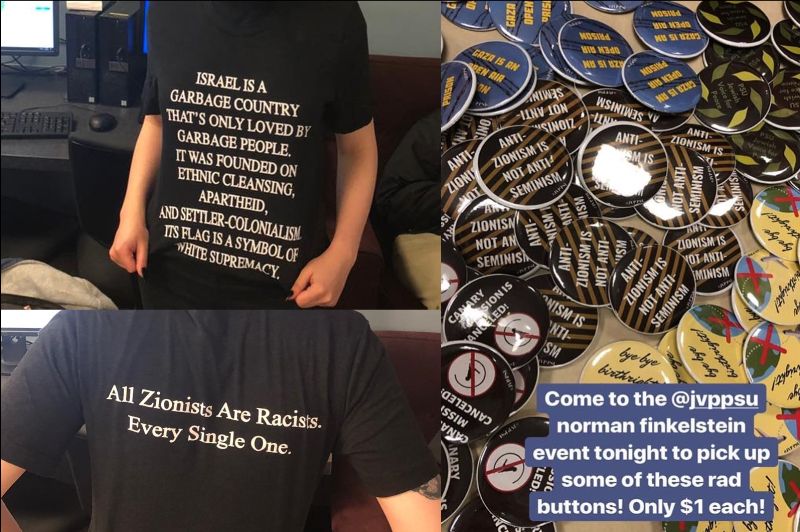AMCHA’S NEW REPORT:
300% Surge in Attack on Global Definition of Antisemitism Strongly Linked to Anti-Jewish Harassment, Increased Activity of JVP
Report Offers Novel Approach to Protecting Jewish Students on Pandemic and Post-Pandemic Campuses

This week, AMCHA Initiative released its annual report, Understanding Campus Antisemitism in 2019 And Its Lessons for Pandemic and Post-Pandemic U.S. Campuses, which documented a more than 300% increase in campus activity intended to undermine and discredit the International Holocaust Remembrance Alliance (IHRA) definition’s identification of anti-Zionism as a form of antisemitism. The report also found that this surge was accompanied by an increase in antisemitic incidents targeting Jewish students for harm.
Specifically, AMCHA found that expression challenging the IHRA definition increased 3.7 times from 34 incidents in 2018 to 126 incidents in 2019. Schools where these challenges occurred were more than twice as likely to host antisemitic incidents targeting Jewish students for harm, and the more challenges the higher the number of incidents.
 A large majority of these challenges came from anti-Zionist student groups, chief among them Students for Justice in Palestine (SJP) and the anti-Zionist Jewish Voice for Peace (JVP), with JVP’s campus activity increasing 45% in 2019, and much of their activity involving challenges to the definition of antisemitism.
A large majority of these challenges came from anti-Zionist student groups, chief among them Students for Justice in Palestine (SJP) and the anti-Zionist Jewish Voice for Peace (JVP), with JVP’s campus activity increasing 45% in 2019, and much of their activity involving challenges to the definition of antisemitism.
The dramatic uptick in challenges to the definition of antisemitism is likely a response to recent federal, state and student efforts, as well as the Trump Administration’s recent executive order, to get government agencies and universities to use the IHRA definition to ensure that Jewish students are adequately protected from anti-Semitic harassment under anti-discrimination laws, such as Title VI of the 1964 Civil Rights Act, and university harassment policies based on them. Although Jewish students have been considered a protected minority under Title VI for several years, their complaints of Israel-related harassment have regularly been dismissed by the Department of Education and ignored by university administrators. It was therefore hoped that use of the IHRA definition would allow government officials and university administrators to recognize and adequately address Israel-related harassment as anti-Semitism.
However, given the extent of the pushback to the IHRA definition documented in the report and its linkage to acts of anti-Zionist motivated harassment, it remains unclear how effective efforts to address Israel-related antisemitism using the IHRA definition and civil rights law will ultimately be.
AMCHA’s report offers an alternative approach to protecting Jewish students that does not depend on how one defines antisemitism or understands Jewish identity. It is based on the view that Jewish students are best protected when all students are equally protected from behavior that violates their right to self-expression or impedes their ability to full participation in campus life. Instead of seeking protection for individual Jewish students as members of a federally-protected identity group, the approach seeks protection for Jewish students as individuals, with the same rights as all other individuals, to be free from behaviors that seek to suppress or deny their basic liberties, including the freedom to express their opinions, beliefs and group identity.
Rooted in First Amendment principles, AMCHA’s new approach calls on colleges and universities to take a number of steps to combat intolerant behavior that suppresses student expression, including: (1) view intolerant behavior, including antisemitic harassment, as a major threat to students’ right to freedom of expression; (2) consider intolerant behavior to be actionable when it infringes to an unacceptable degree on the freedom of expression of others; (3) establish robust bullying/cyberbullying policies that protect all students equally from intolerant behavior that suppresses expression or restricts the ability to participate in campus life, irrespective of the motivation of the perpetrator or the identity of the victim; and (4) establish fair and consistent protocols for handling intolerant but constitutionally protected speech.
Additional findings from the report include:
- In contrast to what has been documented globally, campuses, for the second year in a row campuses have experienced a significant decline in incidents of classic antisemitic harassment (down 49%) and a significant increase in Israel-related incidents (up 60%).
- Such Israel-related antisemitic harassment is far more likely than classical antisemitic harassment to occur online or be adaptable to the online platforms that will be utilized in 2020/2021 for COVID-19-related distance learning.
- Promotion of academic BDS, including attempts to restrict or shut down popular study abroad programs, continued to rise dramatically and was strongly correlated with discrimination against, harassment of and the suppression of speech of Jewish students.








